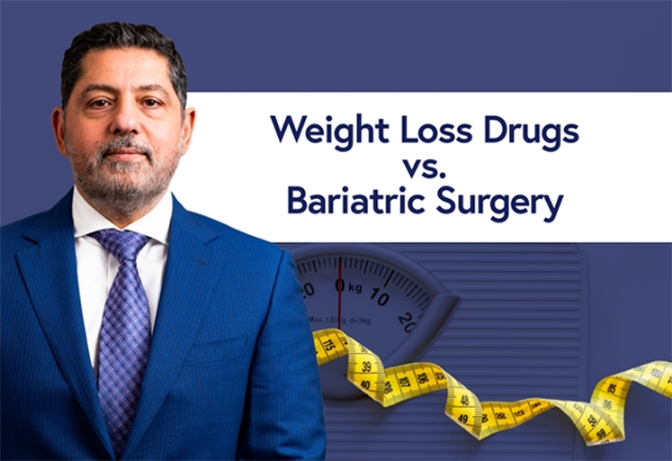Weight Loss Drugs vs. Bariatric Surgery – Which is Right For You?
If you’re trying to lose weight and finding it difficult, you may have considered taking medications or undergoing bariatric surgery. Both of these... read more
Call Us Today (732) 640-5316
E-Waiting RoomIf you’re trying to lose weight and finding it difficult, you may have considered taking medications or undergoing bariatric surgery. Both of these options offer potential solutions to help reduce your overall body weight, but are very different in terms of outcomes, cost, and risks. In this blog, we’ll provide an overview of each option, helping you decide which is the most suitable for your individual needs when it comes to tackling excess weight effectively – and safely!
Weight gain occurs when an individual consumes more calories than their body burns. Several factors can contribute to this calorie imbalance, including:
Dr. Ragui Sadek, a board-certified bariatric surgeon and founder of Advanced Surgical & Bariatrics, explains the process of weight gain:
People may need to lose weight for various health and lifestyle-related reasons. Studies have shown that even if an overweight person seems otherwise healthy, there is still damage occurring to the heart, arteries, and other parts of the body. This can result in heart disease, high blood pressure, and other complications.
Dr. Sadek explains these complications in further detail:
Bariatric surgery is a well-established method for long-term weight loss. This surgical approach involves altering the digestive system to induce weight loss by restricting food intake and altering nutrient absorption. Procedures such as gastric bypass, sleeve gastrectomy, and gastric banding are common forms of bariatric surgery.
Bariatric surgery not only facilitates weight loss, but often leads to improvements in obesity-related comorbidities such as type 2 diabetes, hypertension, and sleep apnea.
New prescription medications – such as Ozempic, Mounjaro, and Wegovy, among others – have many wondering if bariatric surgery is still the best option for weight loss. These medications, also known as semaglutides, work by mimicking the action of a gut hormone called GLP-1, which is released after eating. This helps in weight loss by suppressing your appetite and making you feel full longer.
Bariatric surgery patients lose an average of 50-70% of excess body weight, while semaglutides are associated with 10-15% of excess body weight.
The staff are very professional and caring. The doctors are amazing and have made my experience with both my surgeries not only worry free but comfortable for me. I was able to express my concerns and questions and had the doctors walk me through the step by step process with ease.
Elena M.Weight loss drugs typically involve ongoing costs, as they are often prescribed for extended periods to maintain weight loss. Price can vary on the specific drug and dosage. However, it’s important to note that weight loss drugs are generally more affordable in the short term compared to surgery. Insurance will typically only cover the cost of semaglutides if the patient is diabetic, not for weight loss reasons.
Dr. Sadek says the lack of research into weight loss drugs is the reason why semaglutides are yet to be covered by insurance:
There are significant costs to bariatric surgery, including the surgical procedure, pre-operative assessments, post-operative care, and potential follow-up treatments. However, most insurance companies will at least partially cover the cost of surgery, as long as certain criteria are met, such as BMI requirements or a documented history of weight loss efforts.
Common side effects of weight loss drugs include gastrointestinal issues, increased heart rate, insomnia, and potential dependency. Although these drugs undergo rigorous testing for safety and efficacy before approval, long-term effects may not be fully known.
Bariatric surgery carries surgical risks, including infection, bleeding, blood clots, and adverse reactions to anesthesia. Additionally, there are potential long-term complications such as nutritional deficiencies, gastrointestinal issues, and the need for follow-up surgeries.
The choice between weight loss drugs and bariatric surgery is dependent on several factors. Your current BMI and health status should be evaluated. Bariatric surgery is often recommended for individuals with a BMI of 40 or higher, while weight loss drugs may be considered for those with a BMI of 30 or higher.
You should also consider how quickly you wish to achieve your weight loss goals. Bariatric surgery typically leads to more rapid and substantial weight loss compared to medication.
Dr. Sadek provides additional insight into considerations of this decision:
It’s important to consider all of the risks and benefits when it comes to choosing a treatment option for weight loss. Weighing cost, risk, and convenience can help you make the best decision for your health and lifestyle. Bariatric surgery has been around for many years and can provide lasting results; however, with the introduction of newer weight loss drugs as an alternative option, you have more options at your disposal to help achieve a healthy weight.
Remember to always talk to your doctor or health care provider before attempting any kind of extreme weight loss methods at home or over the counter. If you’re thinking about making a change in how you’re managing your current body weight situation, now is the time. Start researching what options are available to you and schedule a consultation at Advanced Surgical & Bariatrics today.

Dr. Ragui Sadek is a premier surgeon who established a state-of-the-art and one of the safest bariatric surgery programs in the state. Dr. Sadek has fellowship training in both laparoscopic/bariatric surgery and surgical trauma/critical care, allowing him to safely perform complex surgeries on patients who have been turned down by other practices. As a Clinical Assistant Professor of surgery at RWJ Medical School & the Director of bariatric surgery program at RWJ University Hospital, Dr. Sadek offers a cutting-edge range of laparoscopic, robotic, & bariatric surgical procedures with a complication rate substantially below the national average.
Dr. Sadek is a Clinical Assistant Professor of Surgery at Rutgers-Robert Wood Johnson Medical School and a Fellow of the American College of Surgeons. Having performed more than three thousand advanced surgical procedures, Dr. Sadek has established a strong patient satisfaction rate and a solid reputation among the surgical community and is renowned as a top physician in his field by International Association of Healthcare Professionals. As a board-certified surgeon, he holds affiliations with the American Society of Metabolic and Bariatric Surgery and the Society of American Gastro Endoscopic Surgeons. More about Dr. Sadek
Stay current with Advanced Surgical & Bariatrics of New Jersey

If you’re trying to lose weight and finding it difficult, you may have considered taking medications or undergoing bariatric surgery. Both of these... read more

Are you frustrated with your inability to lose weight? Tired of being trapped in an endless cycle of yo-yo dieting, over-exercising, cleanses, and... read more